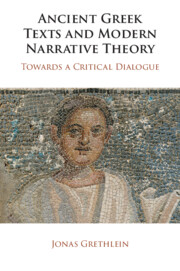Book contents
- Ancient Greek Texts and Modern Narrative Theory
- Ancient Greek Texts and Modern Narrative Theory
- Copyright page
- Contents
- Figures
- Acknowledgements
- Chapter 1 Narratology and Classics
- Chapter 2 Word and World: Fiction(ality)
- Chapter 3 Voice(s): Author/Narrator/Character
- Chapter 4 Minds
- Chapter 5 Motivation
- Chapter 6 Ancient Texts and Postmodern Challenges
- References
- Index Locorum
- General Index
Chapter 1 - Narratology and Classics
Published online by Cambridge University Press: 11 May 2023
- Ancient Greek Texts and Modern Narrative Theory
- Ancient Greek Texts and Modern Narrative Theory
- Copyright page
- Contents
- Figures
- Acknowledgements
- Chapter 1 Narratology and Classics
- Chapter 2 Word and World: Fiction(ality)
- Chapter 3 Voice(s): Author/Narrator/Character
- Chapter 4 Minds
- Chapter 5 Motivation
- Chapter 6 Ancient Texts and Postmodern Challenges
- References
- Index Locorum
- General Index
Summary
After acknowledging the important contribution of structuralist narratology to the study of ancient literature in the past decades, the first chapter highlights its price: forged mostly in the reading of modern novels, narratological taxonomies have occluded peculiarities of ancient narrative and its understanding of narrative. I discuss various alternative approaches to ancient narrative and then introduce the one chosen in this book: I take key concepts of modern narrative theory and explore how ancient texts relate to it. Instead of striving to prove the existence or prefiguration of these concepts in antiquity and thereby to prove ancient literature as modern avant la lettre, I will zero in on the fault lines, where the ancient sense of narrative does not map onto our categories.
Keywords
Information
- Type
- Chapter
- Information
- Ancient Greek Texts and Modern Narrative TheoryTowards a Critical Dialogue, pp. 1 - 19Publisher: Cambridge University PressPrint publication year: 2023
